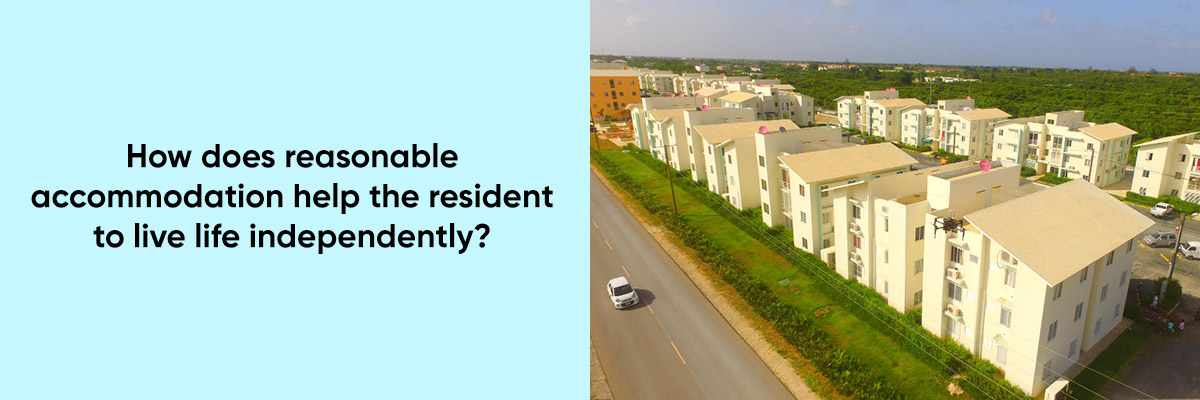The right to live independently is fundamental to a person’s autonomy and freedom. It can be challenging for individuals with disabilities to achieve independence without reasonable accommodations.
In the United States, reasonable accommodations are crucial to ensuring that residents with disabilities can live fulfilling lives.
In this blog, we will understand reasonable accommodation, issues that people with disability face, and how providing reasonable accommodations contributes to the empowerment of residents, fostering a sense of self-reliance and inclusivity.



Understanding Reasonable Accommodation:
Modifications or adjustments made to everyday life to provide reasonable accommodations for people with disabilities are considered reasonable accommodations. The goal is to ensure that people with disabilities participate fully in society by providing them with equal opportunities and access to services.
Also, here’s a video where a disability influencer talks about how hard it is to do seemingly simple tasks:
The Importance of Accessibility and Accommodations // Universal Design! [CC]
Understanding the Challenges Faced by Individuals with Disabilities
Let’s discuss some common issues that disability people have to face:
- Physical Accessibility:
- For individuals with mobility impairments, inaccessible buildings, public spaces, and transportation systems can pose significant challenges.
- It can be difficult for them to navigate and participate fully in various activities if ramps, elevators, and accessible bathrooms are not available.
- Communication Barriers:
- Communication is difficult for people with hearing impairments without sign language interpreters, captioning, or other assistive technologies.
- When essential information is not provided in accessible formats, individuals with hearing and speech impairments may have difficulty communicating with landlords or property managers.
- Social Isolation:
- There is a possibility that stigma and misconceptions about disabilities can cause exclusion and social isolation.
- People with disabilities may be limited in their recreational and social activities by inaccessible events and venues.
- Lack of Accessibility Features:
- Many housing structures lack essential accessibility features such as ramps, elevators, and wider doorways, making it difficult for individuals with mobility impairments to navigate freely within their homes.
- Inaccessible Entrances and Exits:
- Steps and stairs at the entrance or within the living space can pose significant challenges for individuals with mobility issues, limiting their ability to enter or exit their homes independently.
- Unsuitable Bathroom Facilities:
- Inaccessible bathrooms with narrow doorways, high tubs, or insufficient grab bars can hinder individuals with disabilities, making it challenging to perform daily personal care activities safely.
Have a look at the examples of influencer Sara Todd Hammer shows inaccessible bathrooms vs accessible bathrooms:
Inaccessible bathroom:
https://www.instagram.com/reel/CtT-CSFg_yo/?utm_source=ig_web_button_share_sheet
Accesible bathroom:
https://www.instagram.com/reel/Cs3vpDmAUHd/?utm_source=ig_web_button_share_sheet
- Affordability and Financial Strain:
Adapted housing, featuring accessibility modifications, can be expensive. Individuals with disabilities may face financial challenges in acquiring or modifying their homes to meet their specific needs.
- Discrimination in Housing Market:
A persistent issue in the housing market is discrimination. It may be difficult for people with disabilities to secure suitable housing due to landlord reluctance and discriminatory practices.
- Lack of Universal Design:
There is a tendency to overlook universal design principles, which aim to create environments that are accessible to everyone. A lack of universal design features in housing can create unnecessary barriers for people with disabilities.
- Limited Home Modification Resources:
Many people with disabilities are unable to make necessary modifications to their living spaces so that they can be made more accessible due to a lack of resources.
Addressing these challenges requires a collective effort to promote inclusivity, raise awareness, and advocate for policies and practices that support the rights and well-being of people with disabilities.
To understand how people with special needs struggle with even basic tasks, watch this reel:
https://www.instagram.com/reel/CxGc-gAgBgn/?igsh=MWlobW90cnhqbDY0eg==
The role of reasonable accommodation in enabling self-reliance
- Accessible Housing:
Households are one of the main areas where reasonable accommodations can have a significant impact. Among the features of accessible housing are ramps, wider doorways, and accessible bathrooms. With these modifications, residents with disabilities can navigate their living spaces more easily, promoting independence and reducing dependence on others.
- Adaptive Technologies:
In today’s digital age, technology plays a vital role in fostering independence. Reasonable accommodation often involves the use of adaptive technologies, such as screen readers, voice recognition software, and other assistive devices. These technologies enable residents with disabilities to perform daily tasks, access information, and communicate effectively, leveling the playing field in various aspects of life.
- Employment Opportunities:
Reasonable accommodation extends into the workplace, ensuring that individuals with disabilities have equal opportunities for employment. This may involve modifying work schedules, providing specialized equipment, or making adjustments to the physical work environment. By breaking down employment barriers, reasonable accommodation empowers residents to contribute to the workforce and achieve financial independence.
- Transportation Accessibility:
Access to transportation is a key factor in promoting independence. Reasonable accommodation in this context involves accessible public transportation, adapted vehicles, and transportation assistance services. These measures facilitate mobility, allowing residents with disabilities to navigate their communities, access essential services, and participate in social activities independently.
- Inclusive Education:
For students with disabilities, reasonable accommodation ensures equal access to education. This may involve modifications to curriculum materials, accessible classrooms, or support services such as sign language interpreters. By fostering inclusive education, residents with disabilities can pursue their academic goals and develop the skills necessary for an independent and successful future.
You can have a look at this video which shows by providing reasonable accommodation to the people, they can survive independently:
Conclusion:
So, we can say that reasonable accommodation is a cornerstone in the pursuit of an inclusive and accessible society. In the United States, it plays a pivotal role in empowering residents with disabilities to live life independently. By addressing barriers in housing, employment, transportation, and education, reasonable accommodation fosters a more inclusive and equitable society where all individuals can participate fully and lead fulfilling lives on their own terms. As we continue to advocate for the rights of individuals with disabilities, recognizing the importance of reasonable accommodation is essential in building a society that values diversity, inclusion, and independence.


